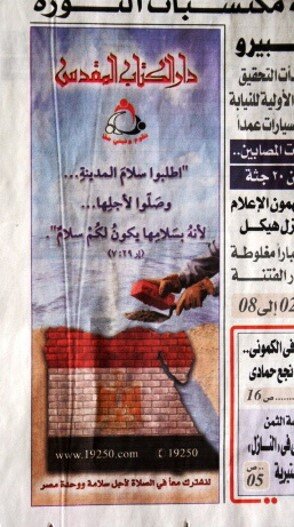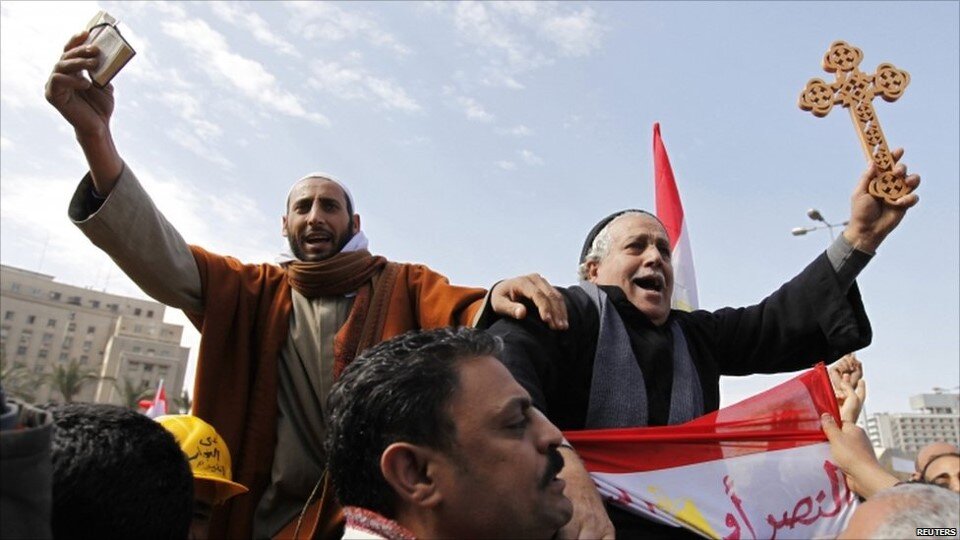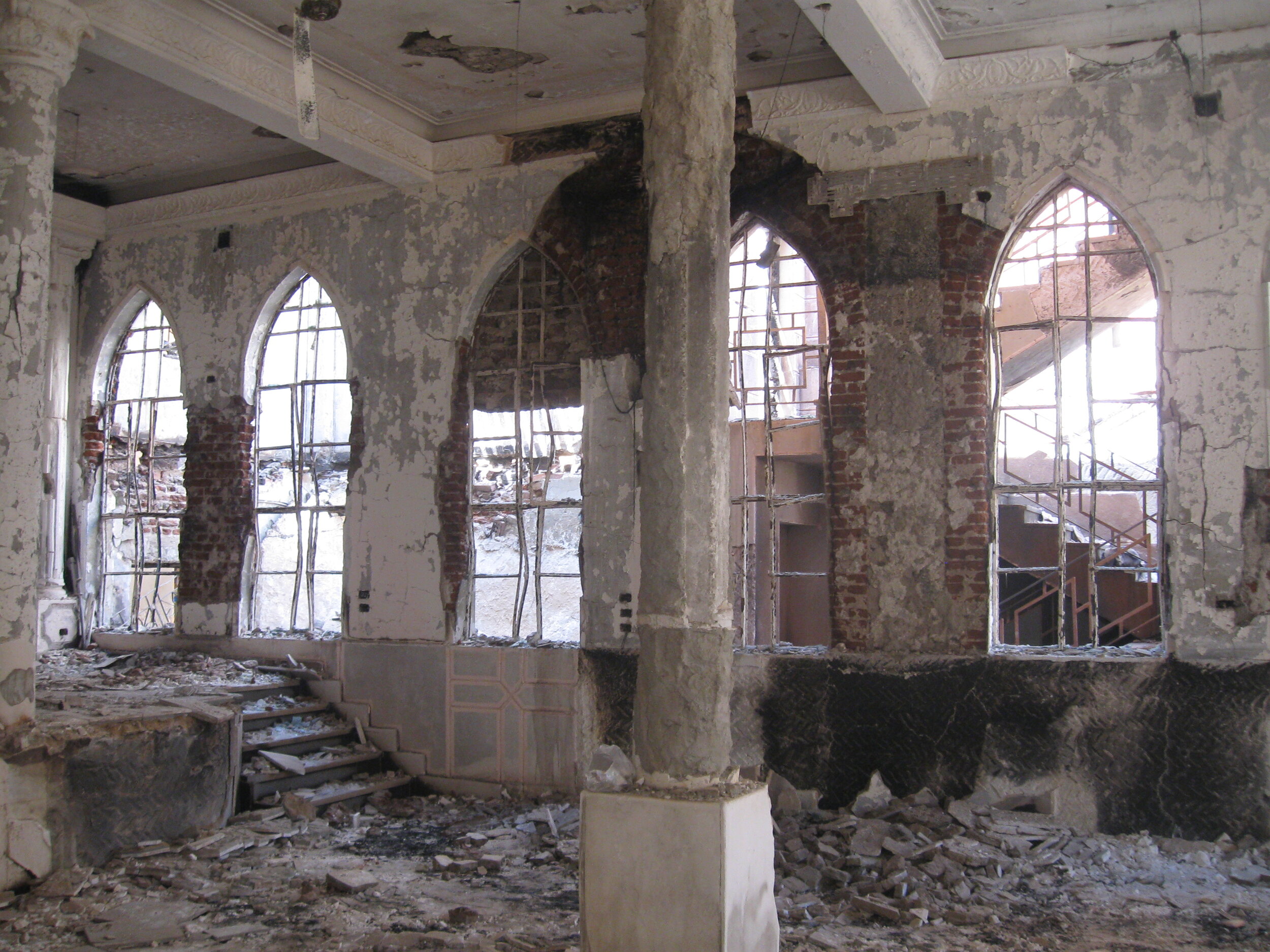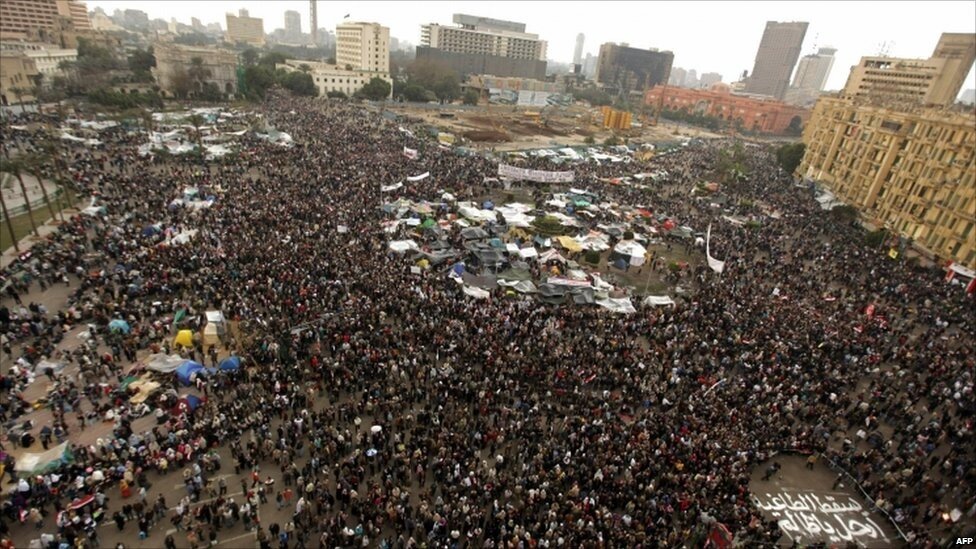The Arab Spring and How It Affected the Church in Egypt
INSTALLMENT 15 OF THE HISTORY OF THE OUTREACH FOUNDATION IN EGYPT
by Jeff Ritchie
Up to now, this history has focused on the Church in Egypt and how The Outreach Foundation has engaged it. But the politics of Egypt have always affected the Christian community there, never more so than during the years 2011-2013. This chapter is the story of the “Arab Spring” as Egyptians experienced it.
Politics and The Outreach Foundation in Egypt: When The Outreach Foundation began working in Egypt, its President, Mr. Hosni Mubarak, had been in office for a long time and was quite authoritarian in his rule. Corruption, ruthless suppression of any opposition and the lack of improvement in the lives of the citizenry led to increasing discontent with his regime. When Outreach groups visited Egypt, the subject of who would become president after Mubarak and what kind of country would it be was frequently a topic of conversation. Alongside the above-mentioned issues, we heard concerns that the next President could be Islamist in orientation, and that the situation of Christians could worsen as a result.
The Arab Spring: Against this backdrop, the Arab Spring arose. It began in Tunisia in December 2010 when a street vendor named Mohammed Bouazizi set himself on fire to protest the arbitrary seizing of his vegetable stand by police over failure to obtain a permit. Street protests ensued in Tunis, the country’s capital, eventually prompting that country’s president to abdicate position and flee to Saudi Arabia.
Activists in other countries in the region were inspired by the regime change in Tunisia and began to protest authoritarian governments in their own nations. In Egypt, the protests began in late January. Christians and Muslims alike came in massive numbers to Tahrir Square in Central Cairo and called for an end to the Mubarak regime and greater participation in the political process.
After only eighteen days of these protests, Mubarak was overthrown, and the country embarked on a quest for a new, democratic Egypt. Christians were relieved that the Mubarak regime had ended and saw it as an opportunity to participate in building a new Egypt.
The Bible Society of Egypt, for example, created billboards and drafted pamphlets and scripture portions to support the national theme, “Let’s Build Egypt Together.” Their message was, “The Bible and the values in it reflect our revolution’s aspirations.”
The Synod of the Nile, the highest council of the Egyptian Presbyterian Church, issued a call to the nation two days before President Mubarak stepped down. In that statement, they called for bread, freedom, dignity, and social justice for all Egyptians.
The Kasr El Dobara Church, which was very close to Tahrir Square (where so many of the demonstrations had been), opened its campus for medical officials to treat those injured in the demonstrations.
With the overthrow of Mubarak, Christians at the grass-roots level formed “Citizen Committees.” Realizing that their future in Egypt was bound to the welfare of all Egyptians, these groups brought together Orthodox, Catholic and Protestant Christians and Moderate Muslims to provide literacy training and basic instruction on how to get an ID card, how to follow the issues, and ways to engage in the exciting, messy process of building a democratic Egypt.
Among the churches, there also was much prayer for the nation. Over 50,000 people from all Christian communions held a prayer gathering in November 2011. At the end of that year, when all churches traditionally hold a New Year’s Eve worship and prayer service, the Kasr El Dobara Church got permission to hold their service outside the church at the nearby Tahrir Square, the scene of so many of the 2011 demonstrations. Thousands of people, Muslims included, gathered there to pray for the future of their country.
However, with the new freedom came the rise of the long-suppressed Muslim Brotherhood as a political force. Other, more militant, Islamist political parties were formed. Attacks on Christians and Christian churches increased with growing disregard for the rule of law. Some Christians, fearing for their future, emigrated to the United States, Europe, or Australia. Most, however, stayed the course and waited with mixed feelings of hope and alarm.
When Parliamentary elections were held in 2012, candidates from the Muslim political parties formed the overwhelming majority. Three candidates ran for President in June of that year, and the winner was Mohamed Morsi, the candidate of the Muslim Brotherhood party. Toward the end of 2012, a new Constitution was approved that contained provisions strengthening the role of Islam in the governance of the land. Christians realized that tough times were ahead.
The Evangelical Presbyterian Church of Egypt responded to this increasingly tense situation in a remarkable way. The Council for Services and Development, the social service arm of the church, developed a project to train church leaders in peace-building which they named “Stand Still through Storms.” The architect of this project was its Chair, the Rev. Dr. Radi Iskandir Atallah. Dr. Radi, a pastor in Alexandria, had seen violence against Christians first-hand in the bombing of a Coptic Orthodox Church by radical Muslims in his city on New Year’s Eve, 2010. He had also witnessed the hundreds of Muslims who formed human shields around the churches in Alexandria days later to protect Christians as they gathered for their Christmas celebration on January 7, 2011.
Having known this pastor and supported his evangelistic work in more peaceful times, The Outreach Foundation was glad to support this new witness to the way of Jesus Christ as his council sought to strengthen Presbyterians throughout Egypt in the practices of conflict resolution, non-violent response to violence, and forgiveness.
Another response to the Islamist rule was that churches simply kept on doing what churches do, namely worship the Lord. What was remarkable about this fact was that Muslims were starting to attend worship. The number was just a trickle, but the pastors were surprised. So were government security forces. On an Outreach Foundation trip to Egypt in April 2013 we heard a pastor tell us, “When the security people came to us, they asked us why we were inviting Muslims to worship. We told them that we had not invited Muslims. They had just shown up. Our doors were open, and they walked in.”
We were to learn that this story was not unique among the churches. The message we took from this was that ordinary Muslims were getting alarmed by the increasing political violence of the Islamist regime. On our evening day in Egypt, we experienced that political violence first-hand. That night there was violence at the main Coptic Orthodox Cathedral just a few blocks from the Cairo Seminary where we were staying. Some of our Seminary friends had a harrowing time getting back to the Seminary after attending a meeting at a local church. We were greatly relieved when they returned safely.
As the spring turned to summer, matters came to a head. Major protests against the Morsi regime were held in June, culminating in early July when the Egyptian military, led by General Abdel Fattah el-Sisi, stepped in and removed Mohamed Morsi from power on July 3, 2013. The military’s action brought great rejoicing to the overwhelming majority of Egyptian people. In the August 2013 Newsletter of the Bible Society of Egypt, Ramez Atallah wrote, “Most Egyptian Muslims and Christians are more united than ever in their common vision for the future, as together they have rejected extremist ‘Political Islam,’ and are working towards the noble task of establishing a civil society which recognizes all Egyptians as equal citizens.”
However, the fury of the Muslim Brotherhood was aroused. In retaliation for the military coup, they went on a rampage in August 2013 and destroyed eighty-five churches and buildings housing Christian ministries. The churches, on their part, did not retaliate. Rather, they shared a message of forgiveness and hope for the future. Pope Tawadros II, the spiritual leader of the Coptic Orthodox Church, had this response to the destruction of the churches, most of which were Coptic Orthodox: “If the destruction of these properties is the price Christians in Egypt have to pay to get a free Egypt, then that sacrifice is worthwhile!” (cited in the September 2013 Newsletter of the Bible Society of Egypt).
In the months that followed, a new constitution was written, General el-Sisi was elected President, and Egypt became stable once more. However, many of the dreams that inspired the Arab Spring in Egypt have been placed on hold, and participatory democracy and economic development for all continue to be aspirational goals. Nevertheless, the work of the Church has positively thrived during the past seven years, and to that, we now turn.




